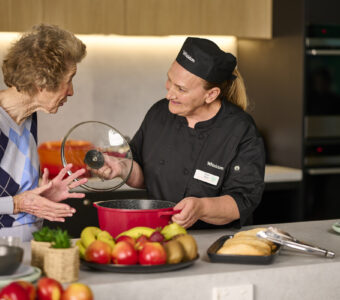
Why A Good Diet Matters In Aged Care
When we think about aged care, one of the most crucial elements is ensuring residents receive a healthy and nutritious diet. While much attention has been paid towards the immediate health benefits, a good diet can also play a vital role in enhancing overall wellbeing and reducing falls, fostering social connections, and promoting positive mental health. In this blog, we’ll explore the broader implications of nutrition and the important part it plays in Whiddon’s approach to aged care.
1. Enhancing Physical Health
A balanced diet tailored to the specific needs of older people can assist with preventing and managing chronic diseases. Providing nutrient-dense meals helps maintain strength, energy levels, and overall physical health, which is crucial for older people who may have diminished appetites or specific dietary requirements.
2. Promoting Mental Wellbeing
There is a well-founded connection between diet and mental health. Nutrient-rich foods are known to support brain health and cognitive function, also preventing conditions related to a higher risk of developing dementia. For residents in aged care, this means a diet that supports mental sharpness and emotional stability, contributing to a higher quality of life.
3. Fostering Social Connections
Mealtimes are social occasions. They offer opportunities for residents to engage with one another, build relationships, and reduce feelings of loneliness and isolation. Dining together can create a sense of community and belonging, which is especially important for those who may feel disconnected from their previous social circles. At Whiddon, we extend this social interaction through our Cooking Clubs, offering the opportunity for residents to get together and share their family cooking experiences with each other.
4. Encouraging Independence And Choice
We believe in giving our residents a voice in their meal choices. By providing a variety of options and catering to personal preferences, we respect their autonomy and encourage better eating habits. This approach not only meets their nutritional needs but also upholds their dignity and personal identity. Residents at Whiddon can enjoy meals that are both healthy and aligned with their tastes and preferences. There are also fortnightly and monthly Foodies Group meetings held with the Chefs to discuss and plan upcoming menus and provide feedback on previous meals and the overall dining experience.
5. Supporting Cultural and Personal Identity
Food is a significant part of cultural and personal identity. As part of our approach, we offer culturally diverse dishes to help residents feel more at home and respected in their cultural practices. This diversity allows residents to share their heritage with others, fostering a richer and more inclusive aged care environment.
6. Improving Dining Environment
Creating a pleasant, calm, and inviting dining atmosphere can stimulate appetite and make mealtime more enjoyable. Attention to detail in the dining setting, such as comfortable seating and appropriate lighting, can make a significant difference. At Whiddon, our dining areas consist of centralised home-style kitchens, where the final stage of food preparation is completed in front of our residents. This builds a stronger relationship with our catering team, creating a more comfortable and inclusive environment.
A Holistic Approach To Dietary Care
At Whiddon, we believe that ensuring a good diet in aged care is about more than just providing nutritious meals. By adopting a holistic approach to dietary care, we can help improve the quality of life for our residents, making mealtime a positive and enriching part of their daily routine. For more information about our model of care, get in touch with our team today.




